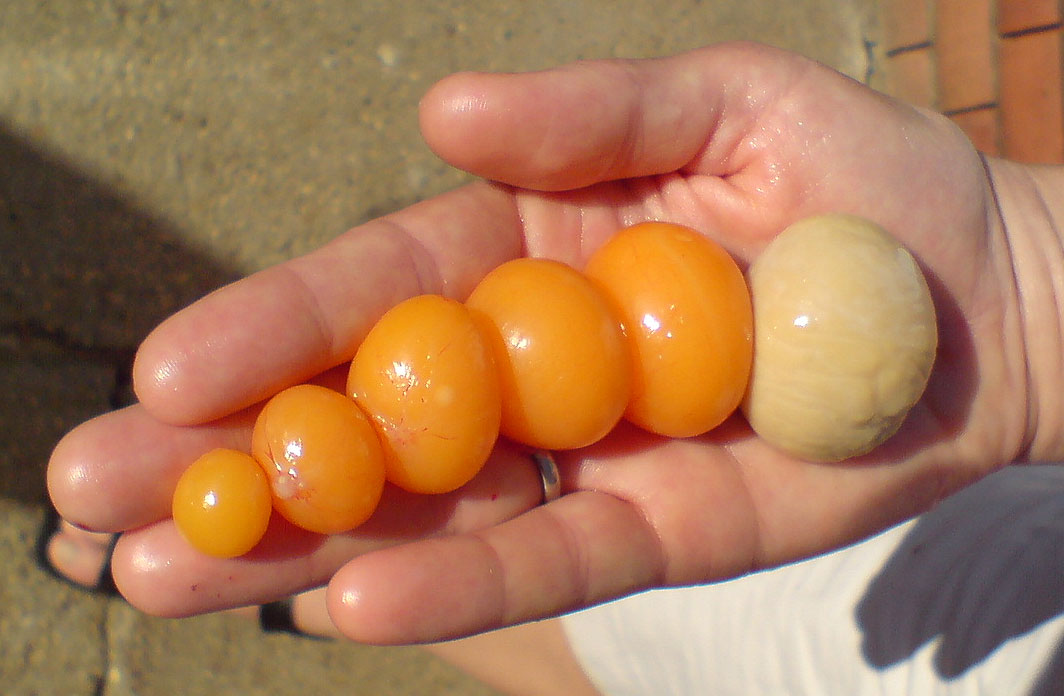Eyerlekh on:
[Wikipedia]
[Google]
[Amazon]
 Eyerlekh ( yi, אייערלעך, "little eggs") are unlaid eggs found inside just-slaughtered chickens and typically cooked in soup. They were historically common in
Eyerlekh ( yi, אייערלעך, "little eggs") are unlaid eggs found inside just-slaughtered chickens and typically cooked in soup. They were historically common in
 Eyerlekh ( yi, אייערלעך, "little eggs") are unlaid eggs found inside just-slaughtered chickens and typically cooked in soup. They were historically common in
Eyerlekh ( yi, אייערלעך, "little eggs") are unlaid eggs found inside just-slaughtered chickens and typically cooked in soup. They were historically common in Ashkenazi
Ashkenazi Jews ( ; he, יְהוּדֵי אַשְׁכְּנַז, translit=Yehudei Ashkenaz, ; yi, אַשכּנזישע ייִדן, Ashkenazishe Yidn), also known as Ashkenazic Jews or ''Ashkenazim'',, Ashkenazi Hebrew pronunciation: , singu ...
Jewish cuisine
Jewish cuisine refers to the worldwide cooking traditions of the Jewish people. During its evolution over the course of many centuries, it has been shaped by Jewish dietary laws (''kashrut''), Jewish festivals and holidays, and traditions cen ...
, but their usage has become much less frequent with the rise of prepackaged chicken parts.
In kashrut
(also or , ) is a set of dietary laws dealing with the foods that Jewish people are permitted to eat and how those foods must be prepared according to Jewish law. Food that may be consumed is deemed kosher ( in English, yi, כּשר), fro ...
, laid eggs are considered pareve
In ''kashrut'', the dietary laws of Judaism, pareve (from yi, פאַרעוו for "neutral", in Hebrew , and also parve and other variant English spellings) is a classification of edible substances that contain neither dairy nor meat ingredients. ...
, while unlaid eggs are generally considered fleishig
Mixtures of milk and meat ( he, בשר בחלב, basar bechalav, meat in milk) are forbidden according to Jewish law. This dietary law, basic to kashrut, is based on two verses in the Book of Exodus, which forbid "boiling a (goat) kid in its m ...
. Because of this, eyerlekh was traditionally served with meat meals rather than dairy meals. According to the Shulchan Aruch
The ''Shulchan Aruch'' ( he, שֻׁלְחָן עָרוּך , literally: "Set Table"), sometimes dubbed in English as the Code of Jewish Law, is the most widely consulted of the various legal codes in Judaism. It was authored in Safed (today in Is ...
(Yoreh De'ah
Yoreh De'ah ( he, יורה דעה) is a section of Rabbi Jacob ben Asher's compilation of halakha (Jewish law), Arba'ah Turim around 1300. This section treats all aspects of Jewish law not pertinent to the Hebrew calendar, finance, torts, marriage, ...
87:5), unlaid eggs are pareve only if fully formed, while unlaid eggs that are not fully formed are considered fleishig and may not be consumed with dairy products. However, dairy products can be consumed after eating partially formed eggs.
References
Ashkenazi Jewish cuisine Egg dishes Kosher meat Shabbat food Yiddish words and phrases {{Jewish-cuisine-stub